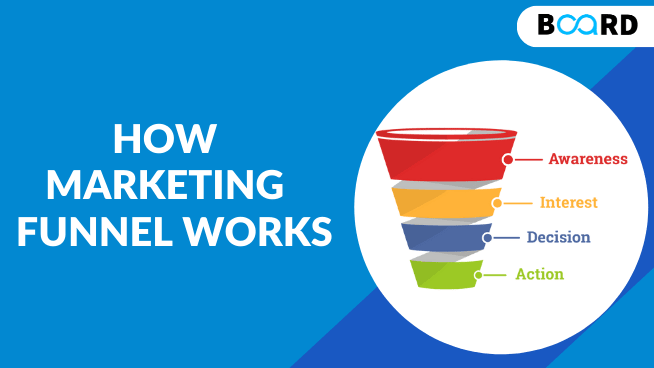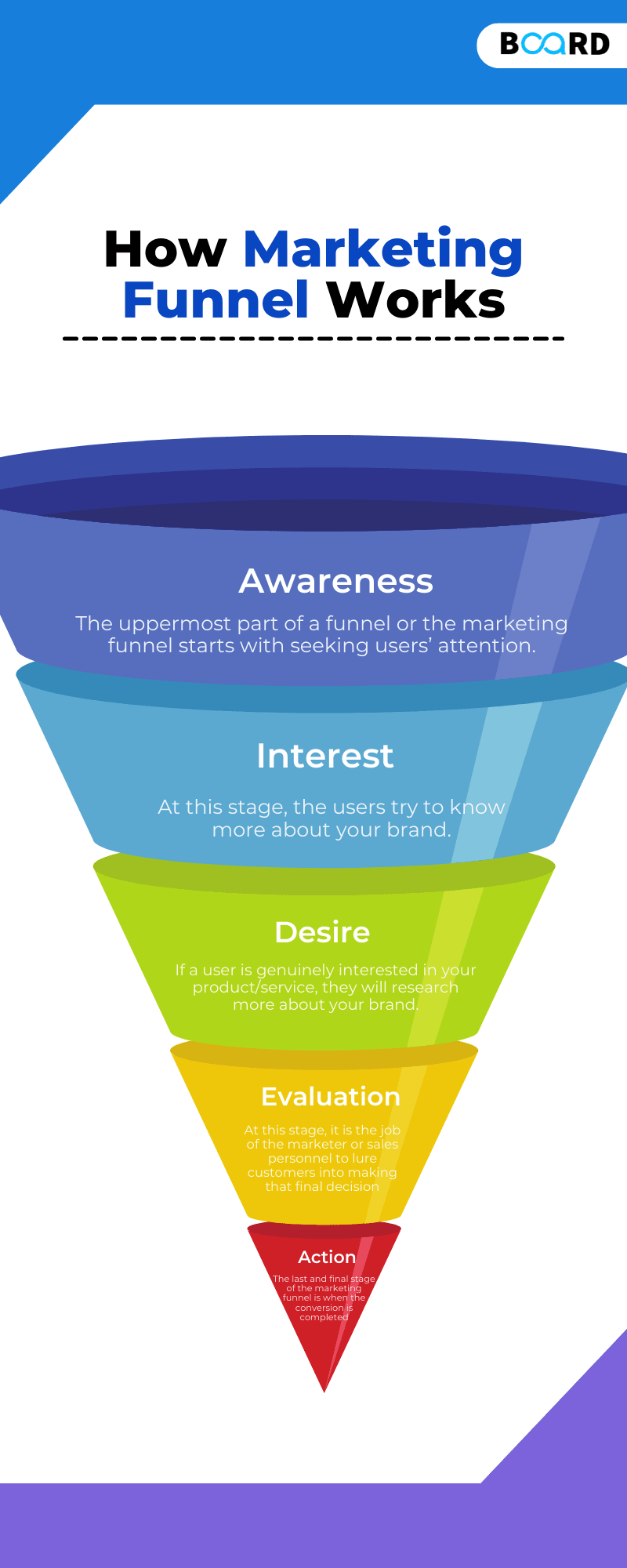Advanced Digital Marketing Concepts & Strategies
How A Marketing Funnel Works

A Marketing Funnel refers to a marketing strategy that focuses on turning prospective users into customers making final purchases.
If you have ever looked at a funnel, you would know that it's shaped like an inverted cone. The marketing funnel takes its essence from the shape of a funnel itself.
Here is everything you need to know about a marketing funnel and how it works, uses of the marketing funnel, types of marketing funnels, etc.
What is a Marketing Funnel?
A marketing funnel is a graphical and detailed representation of how users behave, from when they first come across your brand to when they make a purchase.
At first, plenty of users will come across your brand (this could be through social media platforms, word of mouth, advertising, and other marketing leads), but in the end, only a few of them are interested in your product and make a purchase.
Suppose you are a clothing brand selling your customized clothes online on social media and 10 users come across your brand through digital marketing. Say 5 to 7 users out of 10 will visit your website and will go through your product range. Out of these 5 to 7 prospective visitors, only 2 to 3 users will finalize their purchase and turn into your prospective customers after comparing your product’s review, price, and quality with that of your competitors.
Therefore, just like a funnel that is wide at the top and tapers at the end, a marketing funnel depicts a user's purchase behavior.
What are the Different Stages of Marketing Funnel?
To better understand what each section of a funnel stands for, you need to know about the marketing funnel stages. These stages further help in understanding how the marketing funnel works. The funnel is divided into various sections (also stages), identified as:

1. Awareness
The uppermost part of a funnel or the marketing funnel starts with seeking users’ attention. This attention can be sought through social media posts, marketing campaigns, media mentions, blogs, paper media, and more.
2. Interest
Once you have generated awareness about your brand and have successfully attracted many users, it’s time to pique their interest in your product/services.
At this stage, the users try to know more about your brand. For instance, if a user comes across a media mention about your brand, they will open your social media profile tagged to know more about you.
3. Desire
If a user is genuinely interested in your product/service, they will research more about your brand. This shows their desire to stay connected.
For instance, in the case of retail stores, when a person chooses a dress and decides to try it on, that shows the desire to buy. Similarly, in the case of an eCommerce store, wish-listing products or adding them to the cart shows a user’s willingness to purchase/convert. At this stage, the funnel starts to get narrower.
4. Evaluation
Here, the prospective buyer/customer is just one step away from taking the desired action. At this stage, it is the job of the marketer or sales personnel to lure customers into making that final decision by either sending them conversion emails, notifications, or information that the product is about to get out of stock.
5. Action
The last and final stage of the marketing funnel is when the conversion is completed. The conversion for each business or industry may vary. For an eCommerce site, a conversion is a customer making the final purchase. For a hospitality business like a hotel, booking a room is a conversion. Signing up for a newsletter is a conversion for a blog site.
The marketing funnel usually doesn’t end here. At the end of the funnel is the cylindrical tip that acts as an after-sales service that determines a customer’s product experience. It is the job of the marketers and sales personnel to work towards repeat purchases.
When you hear someone say, "try widening the marketing funnel", you know by now what that means. Not everyone initially attracted to your brand turned into your customer; the funnel narrows down. Widening the funnel means you need to gather a larger audience than before through different marketing tactics (like inbound marketing, brand awareness, etc.) so that more and more people become customers.
Different Types of Marketing Funnels
There are a variety of marketing funnels. A marketing funnel starts with a kind of marketing strategy or marketing campaign, followed by a PPC ad strategy, social media ad marketing strategy, content marketing campaign, advertising IRL, white paper download, and so on.
Any marketing funnel starts with a marketing campaign. Some other types of marketing funnels include:
1. Webinar Funnel
A webinar funnel is for those who are eagerly waiting to host a webinar. It helps analyze if the webinar will gather the kind of audience it should and if it would lead to conversion.
A webinar funnel works on listing down your audience, promoting it through various marketing means, and subsequently following necessary steps.
2. Email Funnel
An email funnel is a visionary path created to get conversions involving a business email id. An email sequence can be part of an email funnel. The conversions in an email funnel would be subscribing to a newsletter, turning subscribers into customers, converting potential attendees to event audiences, and so on.
It can start with allowing users to submit their email ids to you through social media, blog posts, newsletters, etc.
3. Home Page Funnel
As the name suggests, the home page funnel targets the audience to make conversions directly on the home page. It starts by luring a user to a brand’s website (i.e., the home page) through multiple ways to take action before leaving the website.
4. List-Building Funnel
A list-building funnel works on getting information on as many users as possible. It involves creating a list of users to send them follow-up emails, automated messages, etc. Signup pages form an essential part of the list-building funnel.
5. Social-Media Marketing Funnel
A social media marketing funnel refers to creating a route that will allow social media users to become customers. It could start with a Facebook ad followed by re-targeted ads and promotions.
Any purchase directed from a social media site to the main website results from the social media marketing funnel. Post-purchase, a social media marketing funnel can carry on through giveaways and loyalty programs.
6. Lead Magnet Funnel
A funnel that targets getting as many leads as possible and turns them into any conversion is a lead magnet funnel. A lead magnet funnel starts with organizing lead generation campaigns, i.e., campaigns that attract users who are more likely to be interested in the brand's product/service.
7. Video Marketing Funnel
A video marketing funnel is a path created to analyze how a business video will perform. More importantly, it focuses on maximizing a video's reach and results in adding up to conversions. Creating a high-quality video involves an ample amount of work. A video marketing funnel makes sure that when a video is released, it reaches the maximum number of people and can work its magic.
The purpose of all these funnels is the same, i.e. gather as many prospective customers as possible and turn them into conversions. Altogether, these can be termed a conversion funnel. Eventually, all work towards increasing the conversion rates of a business.
Uses of Marketing Funnel
A marketing funnel can be used to track down how users are reacting to your website. It isn’t limited to just allowing users to sign up for a newsletter or make a purchase. You can use a marketing funnel at every stage of the website flow, beginning from newsletter signup to engaging with your blog posts.
Break down business goals into smaller goals and apply a marketing funnel to each goal. Identify how you want your visitors to act and work upon making that happen through a funnel.
Once you access and explore each goal with data, you will identify the roadblocks, i.e. where visitors are getting turned off. As a marketing team professional, you can work on removing such hurdles.
Conclusion
All in all, a marketing funnel is an interesting part of digital marketing. It’s a broad concept of digital marketing that demands profound understanding.
If you want to learn more about digital marketing, check out our Digital Marketing Online Course to start your career in digital marketing. Gain expertise and mentoring by top business experts and professionals in search engine optimization(SEO), social media, pay-per-click, web analytics, mobile, and email marketing. After completing this course, you will get a digital marketing certification, personalized coaching, and placement assistance.
